Evaluating Technological Interventions for Dementia Caregivers
VerifiedAdded on 2020/05/16
|12
|3021
|90
AI Summary
The increasing prevalence of dementia poses significant challenges to caregiving. This paper evaluates the impact of technology on dementia caregiving through a comprehensive review of existing studies and evidence tables. Various forms of intervention, including web-based programs like WeCareAdvisor™, tele-support services, e-learning platforms, and computerized communication technologies such as TECH@HOME, are examined for their effectiveness in alleviating caregiver burden and improving patient outcomes. The paper highlights how these technological solutions have been instrumental in reducing stress, enhancing social support, and increasing caregiver competence. It concludes that while these interventions show promising results, further research is needed to optimize their implementation and accessibility.
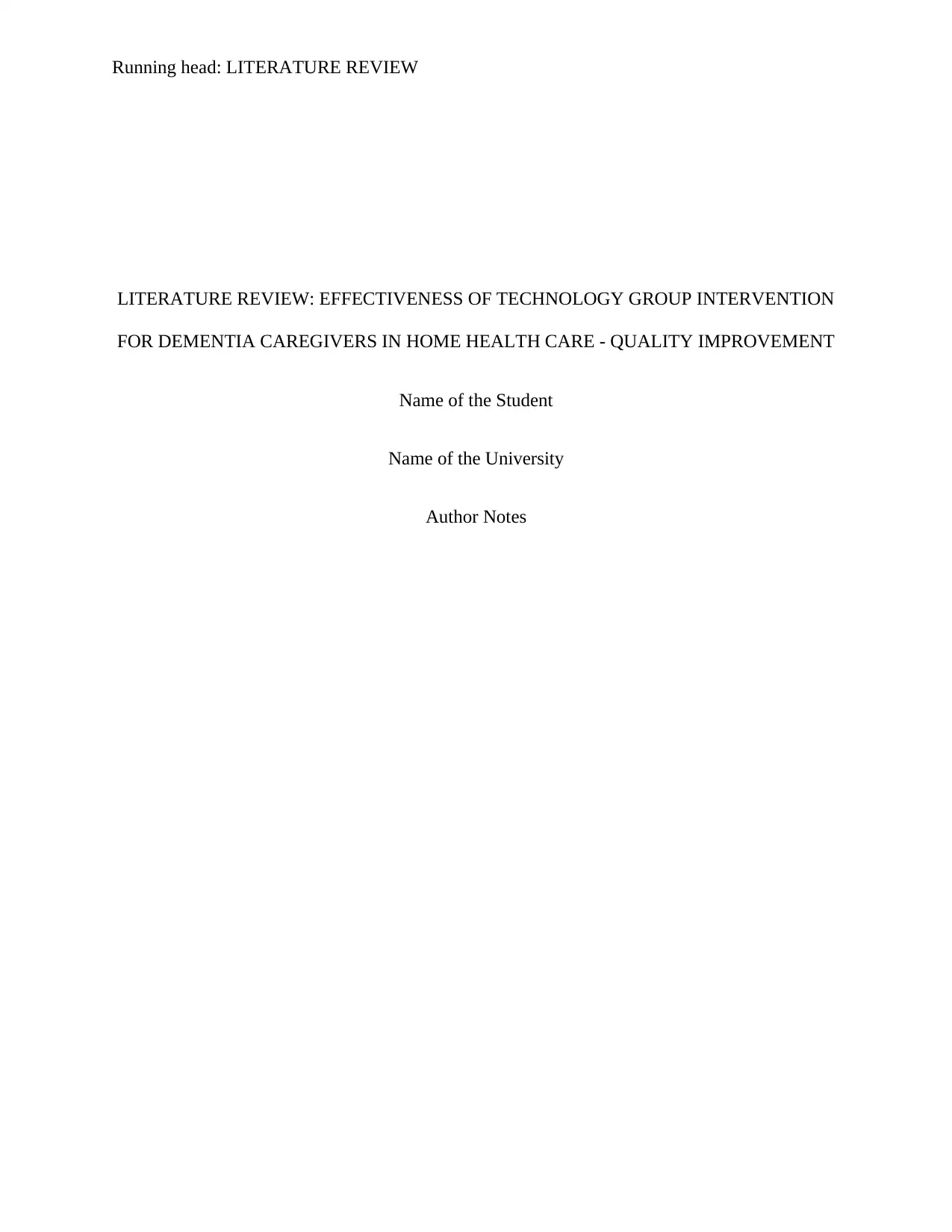
Running head: LITERATURE REVIEW
LITERATURE REVIEW: EFFECTIVENESS OF TECHNOLOGY GROUP INTERVENTION
FOR DEMENTIA CAREGIVERS IN HOME HEALTH CARE - QUALITY IMPROVEMENT
Name of the Student
Name of the University
Author Notes
LITERATURE REVIEW: EFFECTIVENESS OF TECHNOLOGY GROUP INTERVENTION
FOR DEMENTIA CAREGIVERS IN HOME HEALTH CARE - QUALITY IMPROVEMENT
Name of the Student
Name of the University
Author Notes
Paraphrase This Document
Need a fresh take? Get an instant paraphrase of this document with our AI Paraphraser
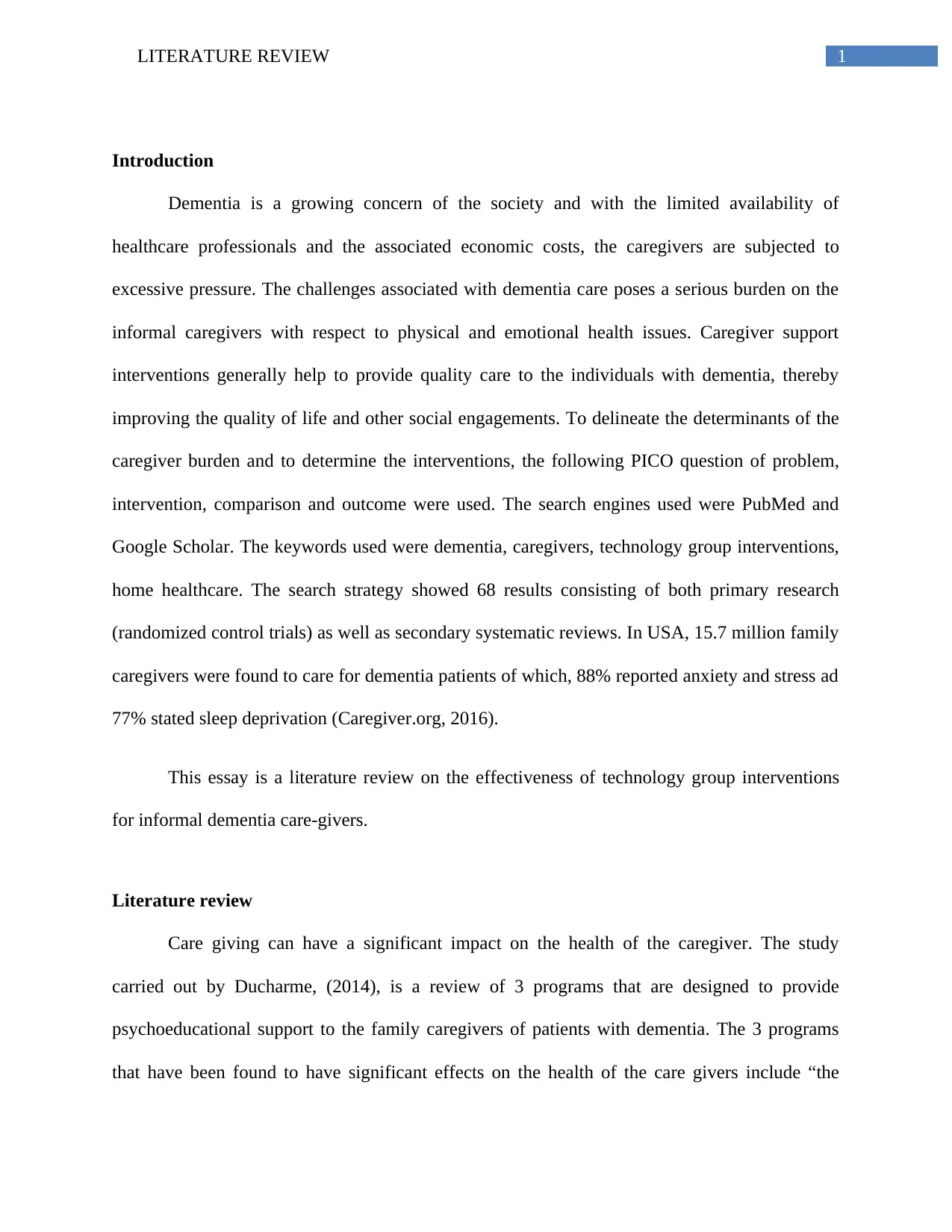
1LITERATURE REVIEW
Introduction
Dementia is a growing concern of the society and with the limited availability of
healthcare professionals and the associated economic costs, the caregivers are subjected to
excessive pressure. The challenges associated with dementia care poses a serious burden on the
informal caregivers with respect to physical and emotional health issues. Caregiver support
interventions generally help to provide quality care to the individuals with dementia, thereby
improving the quality of life and other social engagements. To delineate the determinants of the
caregiver burden and to determine the interventions, the following PICO question of problem,
intervention, comparison and outcome were used. The search engines used were PubMed and
Google Scholar. The keywords used were dementia, caregivers, technology group interventions,
home healthcare. The search strategy showed 68 results consisting of both primary research
(randomized control trials) as well as secondary systematic reviews. In USA, 15.7 million family
caregivers were found to care for dementia patients of which, 88% reported anxiety and stress ad
77% stated sleep deprivation (Caregiver.org, 2016).
This essay is a literature review on the effectiveness of technology group interventions
for informal dementia care-givers.
Literature review
Care giving can have a significant impact on the health of the caregiver. The study
carried out by Ducharme, (2014), is a review of 3 programs that are designed to provide
psychoeducational support to the family caregivers of patients with dementia. The 3 programs
that have been found to have significant effects on the health of the care givers include “the
Introduction
Dementia is a growing concern of the society and with the limited availability of
healthcare professionals and the associated economic costs, the caregivers are subjected to
excessive pressure. The challenges associated with dementia care poses a serious burden on the
informal caregivers with respect to physical and emotional health issues. Caregiver support
interventions generally help to provide quality care to the individuals with dementia, thereby
improving the quality of life and other social engagements. To delineate the determinants of the
caregiver burden and to determine the interventions, the following PICO question of problem,
intervention, comparison and outcome were used. The search engines used were PubMed and
Google Scholar. The keywords used were dementia, caregivers, technology group interventions,
home healthcare. The search strategy showed 68 results consisting of both primary research
(randomized control trials) as well as secondary systematic reviews. In USA, 15.7 million family
caregivers were found to care for dementia patients of which, 88% reported anxiety and stress ad
77% stated sleep deprivation (Caregiver.org, 2016).
This essay is a literature review on the effectiveness of technology group interventions
for informal dementia care-givers.
Literature review
Care giving can have a significant impact on the health of the caregiver. The study
carried out by Ducharme, (2014), is a review of 3 programs that are designed to provide
psychoeducational support to the family caregivers of patients with dementia. The 3 programs
that have been found to have significant effects on the health of the care givers include “the
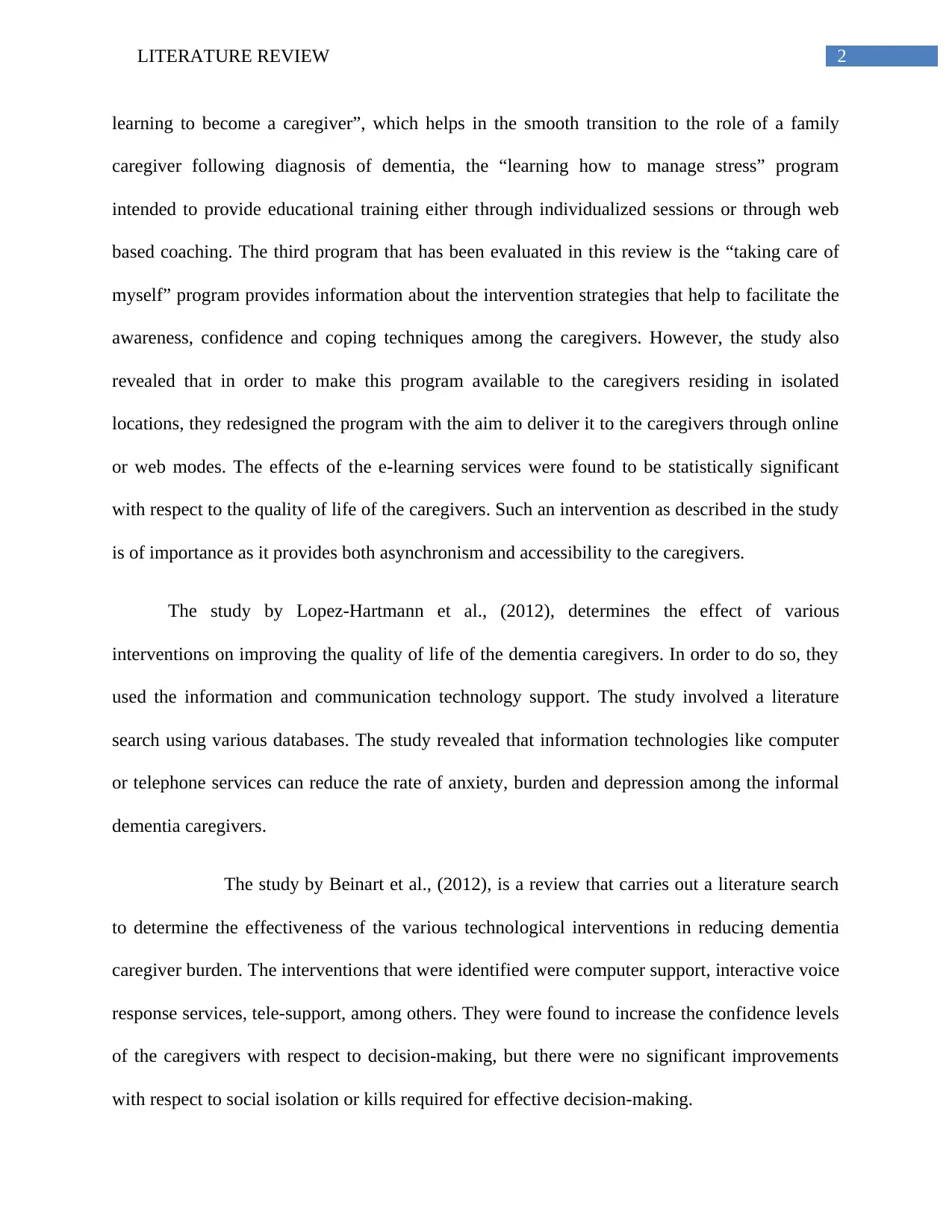
2LITERATURE REVIEW
learning to become a caregiver”, which helps in the smooth transition to the role of a family
caregiver following diagnosis of dementia, the “learning how to manage stress” program
intended to provide educational training either through individualized sessions or through web
based coaching. The third program that has been evaluated in this review is the “taking care of
myself” program provides information about the intervention strategies that help to facilitate the
awareness, confidence and coping techniques among the caregivers. However, the study also
revealed that in order to make this program available to the caregivers residing in isolated
locations, they redesigned the program with the aim to deliver it to the caregivers through online
or web modes. The effects of the e-learning services were found to be statistically significant
with respect to the quality of life of the caregivers. Such an intervention as described in the study
is of importance as it provides both asynchronism and accessibility to the caregivers.
The study by Lopez-Hartmann et al., (2012), determines the effect of various
interventions on improving the quality of life of the dementia caregivers. In order to do so, they
used the information and communication technology support. The study involved a literature
search using various databases. The study revealed that information technologies like computer
or telephone services can reduce the rate of anxiety, burden and depression among the informal
dementia caregivers.
The study by Beinart et al., (2012), is a review that carries out a literature search
to determine the effectiveness of the various technological interventions in reducing dementia
caregiver burden. The interventions that were identified were computer support, interactive voice
response services, tele-support, among others. They were found to increase the confidence levels
of the caregivers with respect to decision-making, but there were no significant improvements
with respect to social isolation or kills required for effective decision-making.
learning to become a caregiver”, which helps in the smooth transition to the role of a family
caregiver following diagnosis of dementia, the “learning how to manage stress” program
intended to provide educational training either through individualized sessions or through web
based coaching. The third program that has been evaluated in this review is the “taking care of
myself” program provides information about the intervention strategies that help to facilitate the
awareness, confidence and coping techniques among the caregivers. However, the study also
revealed that in order to make this program available to the caregivers residing in isolated
locations, they redesigned the program with the aim to deliver it to the caregivers through online
or web modes. The effects of the e-learning services were found to be statistically significant
with respect to the quality of life of the caregivers. Such an intervention as described in the study
is of importance as it provides both asynchronism and accessibility to the caregivers.
The study by Lopez-Hartmann et al., (2012), determines the effect of various
interventions on improving the quality of life of the dementia caregivers. In order to do so, they
used the information and communication technology support. The study involved a literature
search using various databases. The study revealed that information technologies like computer
or telephone services can reduce the rate of anxiety, burden and depression among the informal
dementia caregivers.
The study by Beinart et al., (2012), is a review that carries out a literature search
to determine the effectiveness of the various technological interventions in reducing dementia
caregiver burden. The interventions that were identified were computer support, interactive voice
response services, tele-support, among others. They were found to increase the confidence levels
of the caregivers with respect to decision-making, but there were no significant improvements
with respect to social isolation or kills required for effective decision-making.
⊘ This is a preview!⊘
Do you want full access?
Subscribe today to unlock all pages.

Trusted by 1+ million students worldwide
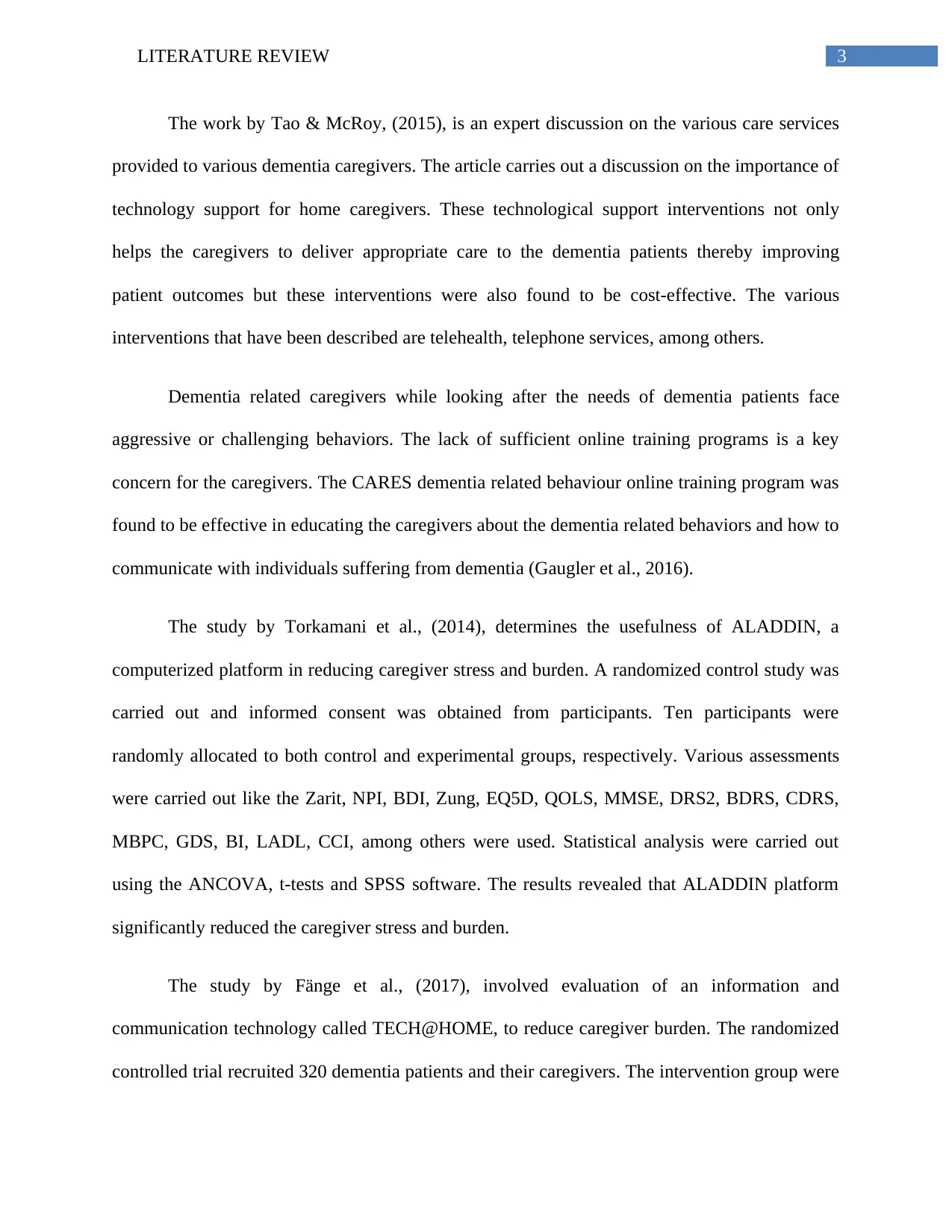
3LITERATURE REVIEW
The work by Tao & McRoy, (2015), is an expert discussion on the various care services
provided to various dementia caregivers. The article carries out a discussion on the importance of
technology support for home caregivers. These technological support interventions not only
helps the caregivers to deliver appropriate care to the dementia patients thereby improving
patient outcomes but these interventions were also found to be cost-effective. The various
interventions that have been described are telehealth, telephone services, among others.
Dementia related caregivers while looking after the needs of dementia patients face
aggressive or challenging behaviors. The lack of sufficient online training programs is a key
concern for the caregivers. The CARES dementia related behaviour online training program was
found to be effective in educating the caregivers about the dementia related behaviors and how to
communicate with individuals suffering from dementia (Gaugler et al., 2016).
The study by Torkamani et al., (2014), determines the usefulness of ALADDIN, a
computerized platform in reducing caregiver stress and burden. A randomized control study was
carried out and informed consent was obtained from participants. Ten participants were
randomly allocated to both control and experimental groups, respectively. Various assessments
were carried out like the Zarit, NPI, BDI, Zung, EQ5D, QOLS, MMSE, DRS2, BDRS, CDRS,
MBPC, GDS, BI, LADL, CCI, among others were used. Statistical analysis were carried out
using the ANCOVA, t-tests and SPSS software. The results revealed that ALADDIN platform
significantly reduced the caregiver stress and burden.
The study by Fänge et al., (2017), involved evaluation of an information and
communication technology called TECH@HOME, to reduce caregiver burden. The randomized
controlled trial recruited 320 dementia patients and their caregivers. The intervention group were
The work by Tao & McRoy, (2015), is an expert discussion on the various care services
provided to various dementia caregivers. The article carries out a discussion on the importance of
technology support for home caregivers. These technological support interventions not only
helps the caregivers to deliver appropriate care to the dementia patients thereby improving
patient outcomes but these interventions were also found to be cost-effective. The various
interventions that have been described are telehealth, telephone services, among others.
Dementia related caregivers while looking after the needs of dementia patients face
aggressive or challenging behaviors. The lack of sufficient online training programs is a key
concern for the caregivers. The CARES dementia related behaviour online training program was
found to be effective in educating the caregivers about the dementia related behaviors and how to
communicate with individuals suffering from dementia (Gaugler et al., 2016).
The study by Torkamani et al., (2014), determines the usefulness of ALADDIN, a
computerized platform in reducing caregiver stress and burden. A randomized control study was
carried out and informed consent was obtained from participants. Ten participants were
randomly allocated to both control and experimental groups, respectively. Various assessments
were carried out like the Zarit, NPI, BDI, Zung, EQ5D, QOLS, MMSE, DRS2, BDRS, CDRS,
MBPC, GDS, BI, LADL, CCI, among others were used. Statistical analysis were carried out
using the ANCOVA, t-tests and SPSS software. The results revealed that ALADDIN platform
significantly reduced the caregiver stress and burden.
The study by Fänge et al., (2017), involved evaluation of an information and
communication technology called TECH@HOME, to reduce caregiver burden. The randomized
controlled trial recruited 320 dementia patients and their caregivers. The intervention group were
Paraphrase This Document
Need a fresh take? Get an instant paraphrase of this document with our AI Paraphraser
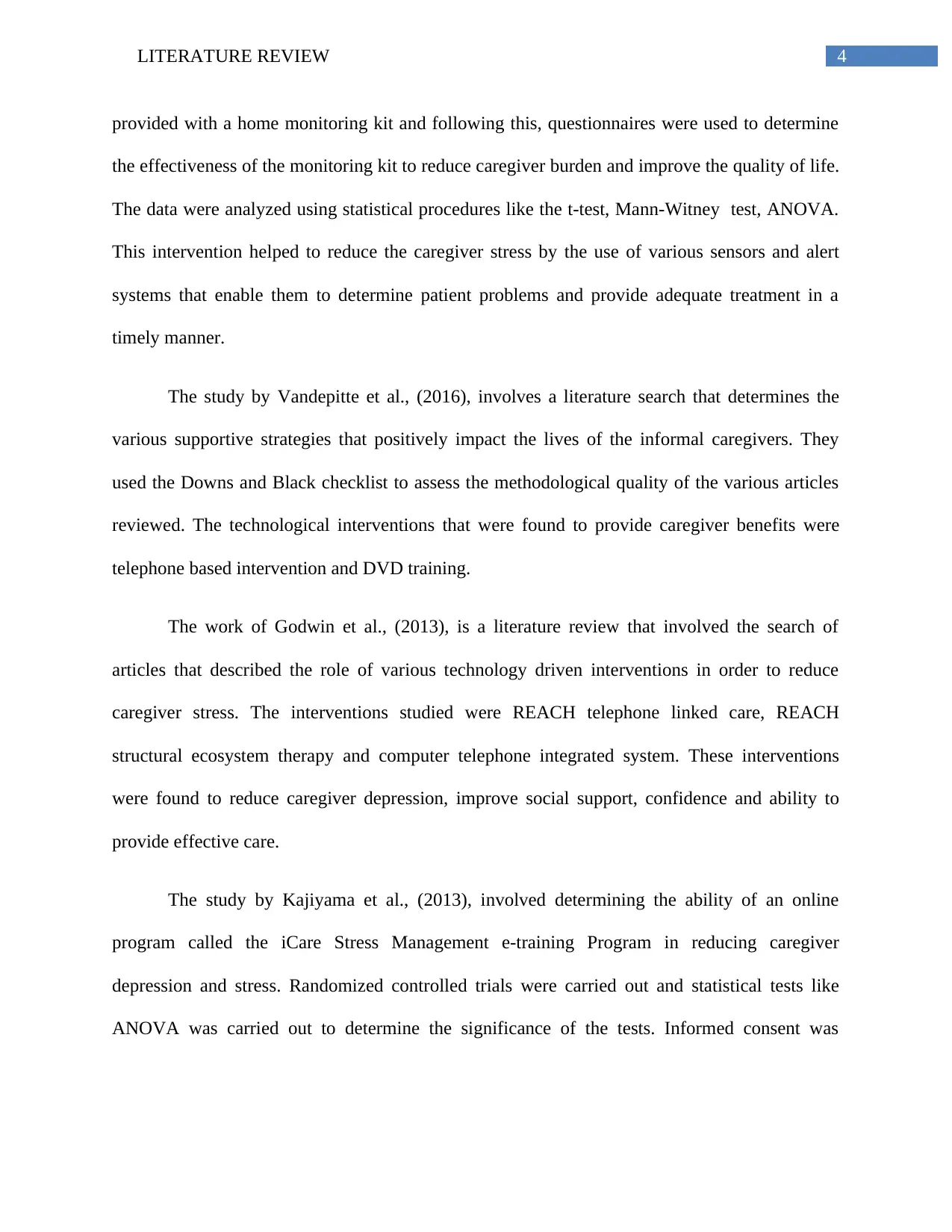
4LITERATURE REVIEW
provided with a home monitoring kit and following this, questionnaires were used to determine
the effectiveness of the monitoring kit to reduce caregiver burden and improve the quality of life.
The data were analyzed using statistical procedures like the t-test, Mann-Witney test, ANOVA.
This intervention helped to reduce the caregiver stress by the use of various sensors and alert
systems that enable them to determine patient problems and provide adequate treatment in a
timely manner.
The study by Vandepitte et al., (2016), involves a literature search that determines the
various supportive strategies that positively impact the lives of the informal caregivers. They
used the Downs and Black checklist to assess the methodological quality of the various articles
reviewed. The technological interventions that were found to provide caregiver benefits were
telephone based intervention and DVD training.
The work of Godwin et al., (2013), is a literature review that involved the search of
articles that described the role of various technology driven interventions in order to reduce
caregiver stress. The interventions studied were REACH telephone linked care, REACH
structural ecosystem therapy and computer telephone integrated system. These interventions
were found to reduce caregiver depression, improve social support, confidence and ability to
provide effective care.
The study by Kajiyama et al., (2013), involved determining the ability of an online
program called the iCare Stress Management e-training Program in reducing caregiver
depression and stress. Randomized controlled trials were carried out and statistical tests like
ANOVA was carried out to determine the significance of the tests. Informed consent was
provided with a home monitoring kit and following this, questionnaires were used to determine
the effectiveness of the monitoring kit to reduce caregiver burden and improve the quality of life.
The data were analyzed using statistical procedures like the t-test, Mann-Witney test, ANOVA.
This intervention helped to reduce the caregiver stress by the use of various sensors and alert
systems that enable them to determine patient problems and provide adequate treatment in a
timely manner.
The study by Vandepitte et al., (2016), involves a literature search that determines the
various supportive strategies that positively impact the lives of the informal caregivers. They
used the Downs and Black checklist to assess the methodological quality of the various articles
reviewed. The technological interventions that were found to provide caregiver benefits were
telephone based intervention and DVD training.
The work of Godwin et al., (2013), is a literature review that involved the search of
articles that described the role of various technology driven interventions in order to reduce
caregiver stress. The interventions studied were REACH telephone linked care, REACH
structural ecosystem therapy and computer telephone integrated system. These interventions
were found to reduce caregiver depression, improve social support, confidence and ability to
provide effective care.
The study by Kajiyama et al., (2013), involved determining the ability of an online
program called the iCare Stress Management e-training Program in reducing caregiver
depression and stress. Randomized controlled trials were carried out and statistical tests like
ANOVA was carried out to determine the significance of the tests. Informed consent was
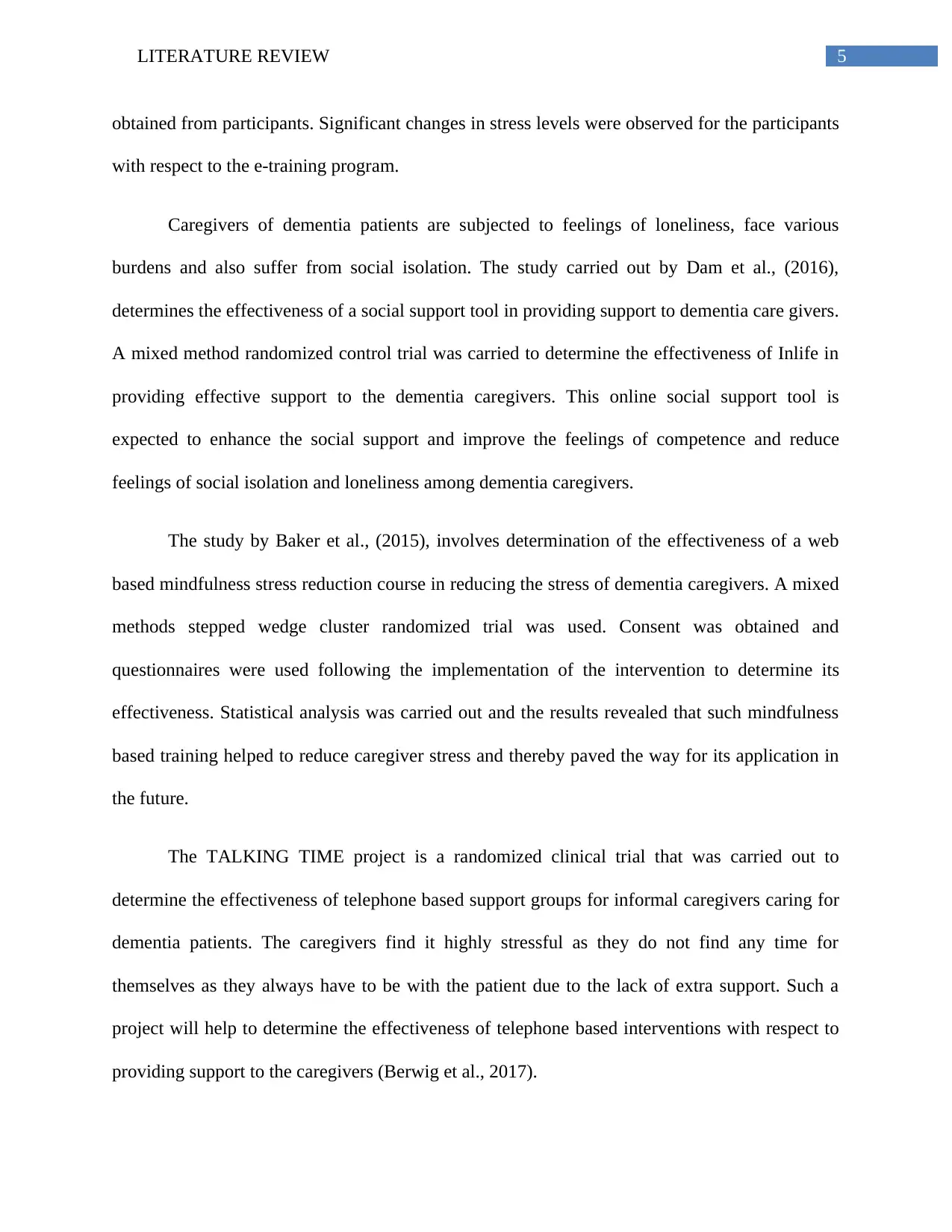
5LITERATURE REVIEW
obtained from participants. Significant changes in stress levels were observed for the participants
with respect to the e-training program.
Caregivers of dementia patients are subjected to feelings of loneliness, face various
burdens and also suffer from social isolation. The study carried out by Dam et al., (2016),
determines the effectiveness of a social support tool in providing support to dementia care givers.
A mixed method randomized control trial was carried to determine the effectiveness of Inlife in
providing effective support to the dementia caregivers. This online social support tool is
expected to enhance the social support and improve the feelings of competence and reduce
feelings of social isolation and loneliness among dementia caregivers.
The study by Baker et al., (2015), involves determination of the effectiveness of a web
based mindfulness stress reduction course in reducing the stress of dementia caregivers. A mixed
methods stepped wedge cluster randomized trial was used. Consent was obtained and
questionnaires were used following the implementation of the intervention to determine its
effectiveness. Statistical analysis was carried out and the results revealed that such mindfulness
based training helped to reduce caregiver stress and thereby paved the way for its application in
the future.
The TALKING TIME project is a randomized clinical trial that was carried out to
determine the effectiveness of telephone based support groups for informal caregivers caring for
dementia patients. The caregivers find it highly stressful as they do not find any time for
themselves as they always have to be with the patient due to the lack of extra support. Such a
project will help to determine the effectiveness of telephone based interventions with respect to
providing support to the caregivers (Berwig et al., 2017).
obtained from participants. Significant changes in stress levels were observed for the participants
with respect to the e-training program.
Caregivers of dementia patients are subjected to feelings of loneliness, face various
burdens and also suffer from social isolation. The study carried out by Dam et al., (2016),
determines the effectiveness of a social support tool in providing support to dementia care givers.
A mixed method randomized control trial was carried to determine the effectiveness of Inlife in
providing effective support to the dementia caregivers. This online social support tool is
expected to enhance the social support and improve the feelings of competence and reduce
feelings of social isolation and loneliness among dementia caregivers.
The study by Baker et al., (2015), involves determination of the effectiveness of a web
based mindfulness stress reduction course in reducing the stress of dementia caregivers. A mixed
methods stepped wedge cluster randomized trial was used. Consent was obtained and
questionnaires were used following the implementation of the intervention to determine its
effectiveness. Statistical analysis was carried out and the results revealed that such mindfulness
based training helped to reduce caregiver stress and thereby paved the way for its application in
the future.
The TALKING TIME project is a randomized clinical trial that was carried out to
determine the effectiveness of telephone based support groups for informal caregivers caring for
dementia patients. The caregivers find it highly stressful as they do not find any time for
themselves as they always have to be with the patient due to the lack of extra support. Such a
project will help to determine the effectiveness of telephone based interventions with respect to
providing support to the caregivers (Berwig et al., 2017).
⊘ This is a preview!⊘
Do you want full access?
Subscribe today to unlock all pages.

Trusted by 1+ million students worldwide
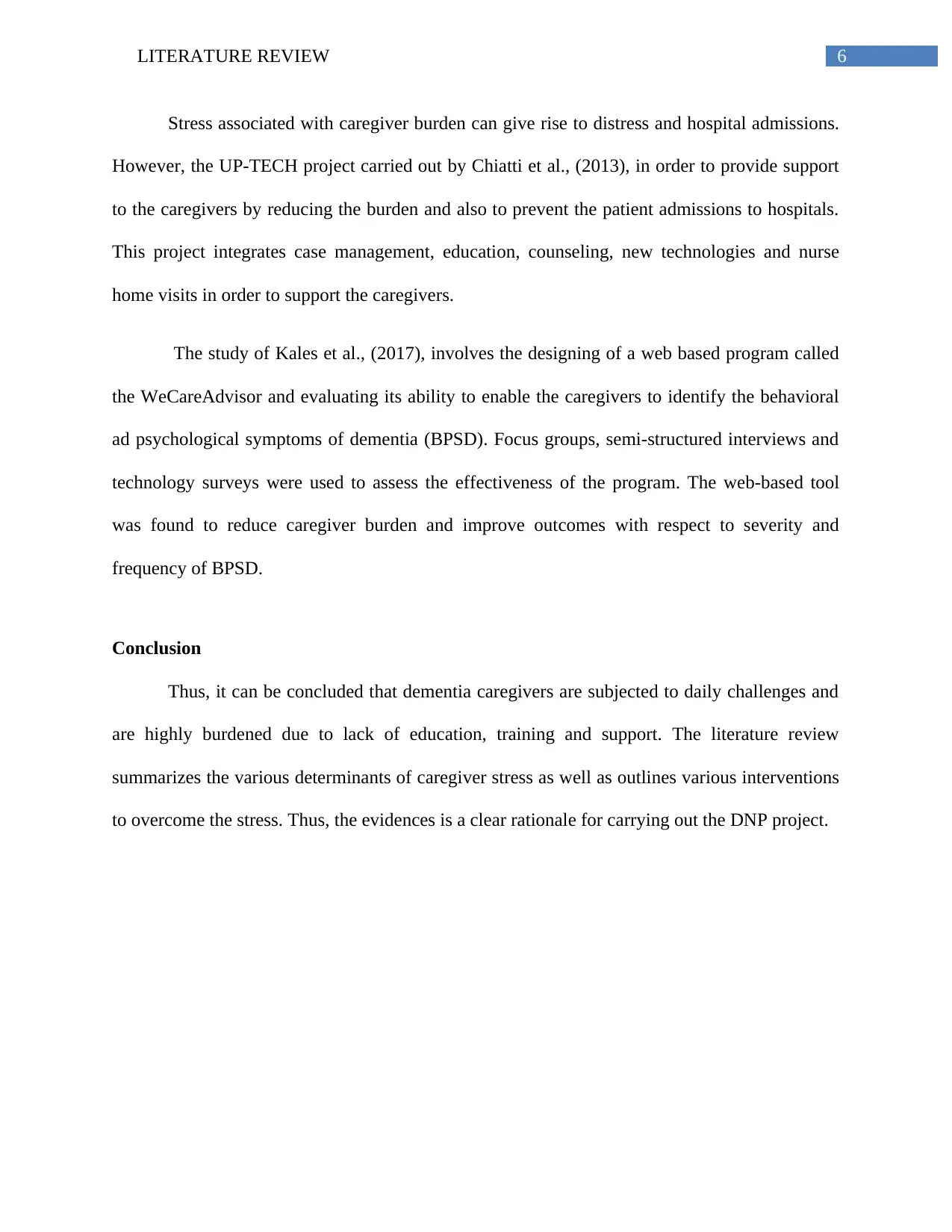
6LITERATURE REVIEW
Stress associated with caregiver burden can give rise to distress and hospital admissions.
However, the UP-TECH project carried out by Chiatti et al., (2013), in order to provide support
to the caregivers by reducing the burden and also to prevent the patient admissions to hospitals.
This project integrates case management, education, counseling, new technologies and nurse
home visits in order to support the caregivers.
The study of Kales et al., (2017), involves the designing of a web based program called
the WeCareAdvisor and evaluating its ability to enable the caregivers to identify the behavioral
ad psychological symptoms of dementia (BPSD). Focus groups, semi-structured interviews and
technology surveys were used to assess the effectiveness of the program. The web-based tool
was found to reduce caregiver burden and improve outcomes with respect to severity and
frequency of BPSD.
Conclusion
Thus, it can be concluded that dementia caregivers are subjected to daily challenges and
are highly burdened due to lack of education, training and support. The literature review
summarizes the various determinants of caregiver stress as well as outlines various interventions
to overcome the stress. Thus, the evidences is a clear rationale for carrying out the DNP project.
Stress associated with caregiver burden can give rise to distress and hospital admissions.
However, the UP-TECH project carried out by Chiatti et al., (2013), in order to provide support
to the caregivers by reducing the burden and also to prevent the patient admissions to hospitals.
This project integrates case management, education, counseling, new technologies and nurse
home visits in order to support the caregivers.
The study of Kales et al., (2017), involves the designing of a web based program called
the WeCareAdvisor and evaluating its ability to enable the caregivers to identify the behavioral
ad psychological symptoms of dementia (BPSD). Focus groups, semi-structured interviews and
technology surveys were used to assess the effectiveness of the program. The web-based tool
was found to reduce caregiver burden and improve outcomes with respect to severity and
frequency of BPSD.
Conclusion
Thus, it can be concluded that dementia caregivers are subjected to daily challenges and
are highly burdened due to lack of education, training and support. The literature review
summarizes the various determinants of caregiver stress as well as outlines various interventions
to overcome the stress. Thus, the evidences is a clear rationale for carrying out the DNP project.
Paraphrase This Document
Need a fresh take? Get an instant paraphrase of this document with our AI Paraphraser
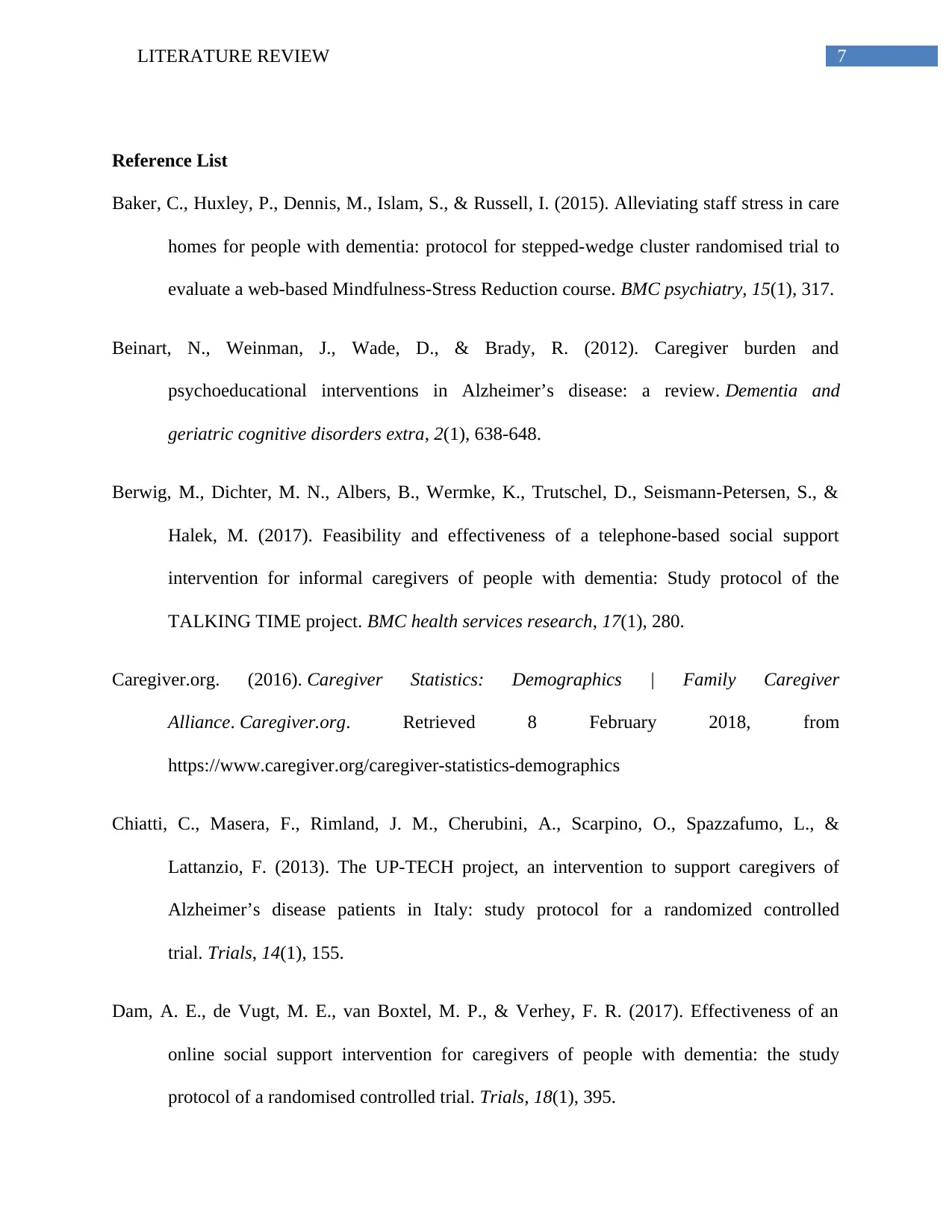
7LITERATURE REVIEW
Reference List
Baker, C., Huxley, P., Dennis, M., Islam, S., & Russell, I. (2015). Alleviating staff stress in care
homes for people with dementia: protocol for stepped-wedge cluster randomised trial to
evaluate a web-based Mindfulness-Stress Reduction course. BMC psychiatry, 15(1), 317.
Beinart, N., Weinman, J., Wade, D., & Brady, R. (2012). Caregiver burden and
psychoeducational interventions in Alzheimer’s disease: a review. Dementia and
geriatric cognitive disorders extra, 2(1), 638-648.
Berwig, M., Dichter, M. N., Albers, B., Wermke, K., Trutschel, D., Seismann-Petersen, S., &
Halek, M. (2017). Feasibility and effectiveness of a telephone-based social support
intervention for informal caregivers of people with dementia: Study protocol of the
TALKING TIME project. BMC health services research, 17(1), 280.
Caregiver.org. (2016). Caregiver Statistics: Demographics | Family Caregiver
Alliance. Caregiver.org. Retrieved 8 February 2018, from
https://www.caregiver.org/caregiver-statistics-demographics
Chiatti, C., Masera, F., Rimland, J. M., Cherubini, A., Scarpino, O., Spazzafumo, L., &
Lattanzio, F. (2013). The UP-TECH project, an intervention to support caregivers of
Alzheimer’s disease patients in Italy: study protocol for a randomized controlled
trial. Trials, 14(1), 155.
Dam, A. E., de Vugt, M. E., van Boxtel, M. P., & Verhey, F. R. (2017). Effectiveness of an
online social support intervention for caregivers of people with dementia: the study
protocol of a randomised controlled trial. Trials, 18(1), 395.
Reference List
Baker, C., Huxley, P., Dennis, M., Islam, S., & Russell, I. (2015). Alleviating staff stress in care
homes for people with dementia: protocol for stepped-wedge cluster randomised trial to
evaluate a web-based Mindfulness-Stress Reduction course. BMC psychiatry, 15(1), 317.
Beinart, N., Weinman, J., Wade, D., & Brady, R. (2012). Caregiver burden and
psychoeducational interventions in Alzheimer’s disease: a review. Dementia and
geriatric cognitive disorders extra, 2(1), 638-648.
Berwig, M., Dichter, M. N., Albers, B., Wermke, K., Trutschel, D., Seismann-Petersen, S., &
Halek, M. (2017). Feasibility and effectiveness of a telephone-based social support
intervention for informal caregivers of people with dementia: Study protocol of the
TALKING TIME project. BMC health services research, 17(1), 280.
Caregiver.org. (2016). Caregiver Statistics: Demographics | Family Caregiver
Alliance. Caregiver.org. Retrieved 8 February 2018, from
https://www.caregiver.org/caregiver-statistics-demographics
Chiatti, C., Masera, F., Rimland, J. M., Cherubini, A., Scarpino, O., Spazzafumo, L., &
Lattanzio, F. (2013). The UP-TECH project, an intervention to support caregivers of
Alzheimer’s disease patients in Italy: study protocol for a randomized controlled
trial. Trials, 14(1), 155.
Dam, A. E., de Vugt, M. E., van Boxtel, M. P., & Verhey, F. R. (2017). Effectiveness of an
online social support intervention for caregivers of people with dementia: the study
protocol of a randomised controlled trial. Trials, 18(1), 395.
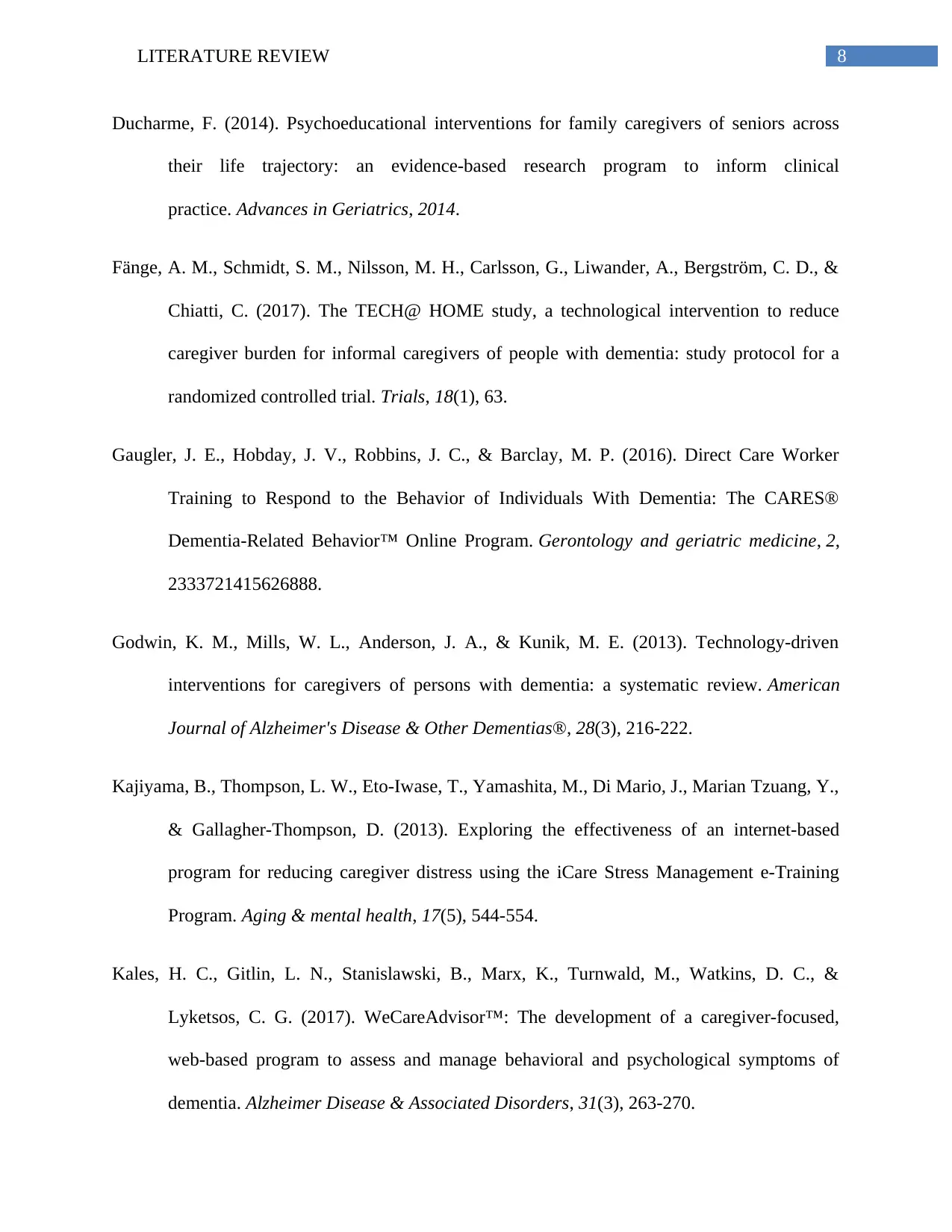
8LITERATURE REVIEW
Ducharme, F. (2014). Psychoeducational interventions for family caregivers of seniors across
their life trajectory: an evidence-based research program to inform clinical
practice. Advances in Geriatrics, 2014.
Fänge, A. M., Schmidt, S. M., Nilsson, M. H., Carlsson, G., Liwander, A., Bergström, C. D., &
Chiatti, C. (2017). The TECH@ HOME study, a technological intervention to reduce
caregiver burden for informal caregivers of people with dementia: study protocol for a
randomized controlled trial. Trials, 18(1), 63.
Gaugler, J. E., Hobday, J. V., Robbins, J. C., & Barclay, M. P. (2016). Direct Care Worker
Training to Respond to the Behavior of Individuals With Dementia: The CARES®
Dementia-Related Behavior™ Online Program. Gerontology and geriatric medicine, 2,
2333721415626888.
Godwin, K. M., Mills, W. L., Anderson, J. A., & Kunik, M. E. (2013). Technology-driven
interventions for caregivers of persons with dementia: a systematic review. American
Journal of Alzheimer's Disease & Other Dementias®, 28(3), 216-222.
Kajiyama, B., Thompson, L. W., Eto-Iwase, T., Yamashita, M., Di Mario, J., Marian Tzuang, Y.,
& Gallagher-Thompson, D. (2013). Exploring the effectiveness of an internet-based
program for reducing caregiver distress using the iCare Stress Management e-Training
Program. Aging & mental health, 17(5), 544-554.
Kales, H. C., Gitlin, L. N., Stanislawski, B., Marx, K., Turnwald, M., Watkins, D. C., &
Lyketsos, C. G. (2017). WeCareAdvisor™: The development of a caregiver-focused,
web-based program to assess and manage behavioral and psychological symptoms of
dementia. Alzheimer Disease & Associated Disorders, 31(3), 263-270.
Ducharme, F. (2014). Psychoeducational interventions for family caregivers of seniors across
their life trajectory: an evidence-based research program to inform clinical
practice. Advances in Geriatrics, 2014.
Fänge, A. M., Schmidt, S. M., Nilsson, M. H., Carlsson, G., Liwander, A., Bergström, C. D., &
Chiatti, C. (2017). The TECH@ HOME study, a technological intervention to reduce
caregiver burden for informal caregivers of people with dementia: study protocol for a
randomized controlled trial. Trials, 18(1), 63.
Gaugler, J. E., Hobday, J. V., Robbins, J. C., & Barclay, M. P. (2016). Direct Care Worker
Training to Respond to the Behavior of Individuals With Dementia: The CARES®
Dementia-Related Behavior™ Online Program. Gerontology and geriatric medicine, 2,
2333721415626888.
Godwin, K. M., Mills, W. L., Anderson, J. A., & Kunik, M. E. (2013). Technology-driven
interventions for caregivers of persons with dementia: a systematic review. American
Journal of Alzheimer's Disease & Other Dementias®, 28(3), 216-222.
Kajiyama, B., Thompson, L. W., Eto-Iwase, T., Yamashita, M., Di Mario, J., Marian Tzuang, Y.,
& Gallagher-Thompson, D. (2013). Exploring the effectiveness of an internet-based
program for reducing caregiver distress using the iCare Stress Management e-Training
Program. Aging & mental health, 17(5), 544-554.
Kales, H. C., Gitlin, L. N., Stanislawski, B., Marx, K., Turnwald, M., Watkins, D. C., &
Lyketsos, C. G. (2017). WeCareAdvisor™: The development of a caregiver-focused,
web-based program to assess and manage behavioral and psychological symptoms of
dementia. Alzheimer Disease & Associated Disorders, 31(3), 263-270.
⊘ This is a preview!⊘
Do you want full access?
Subscribe today to unlock all pages.

Trusted by 1+ million students worldwide
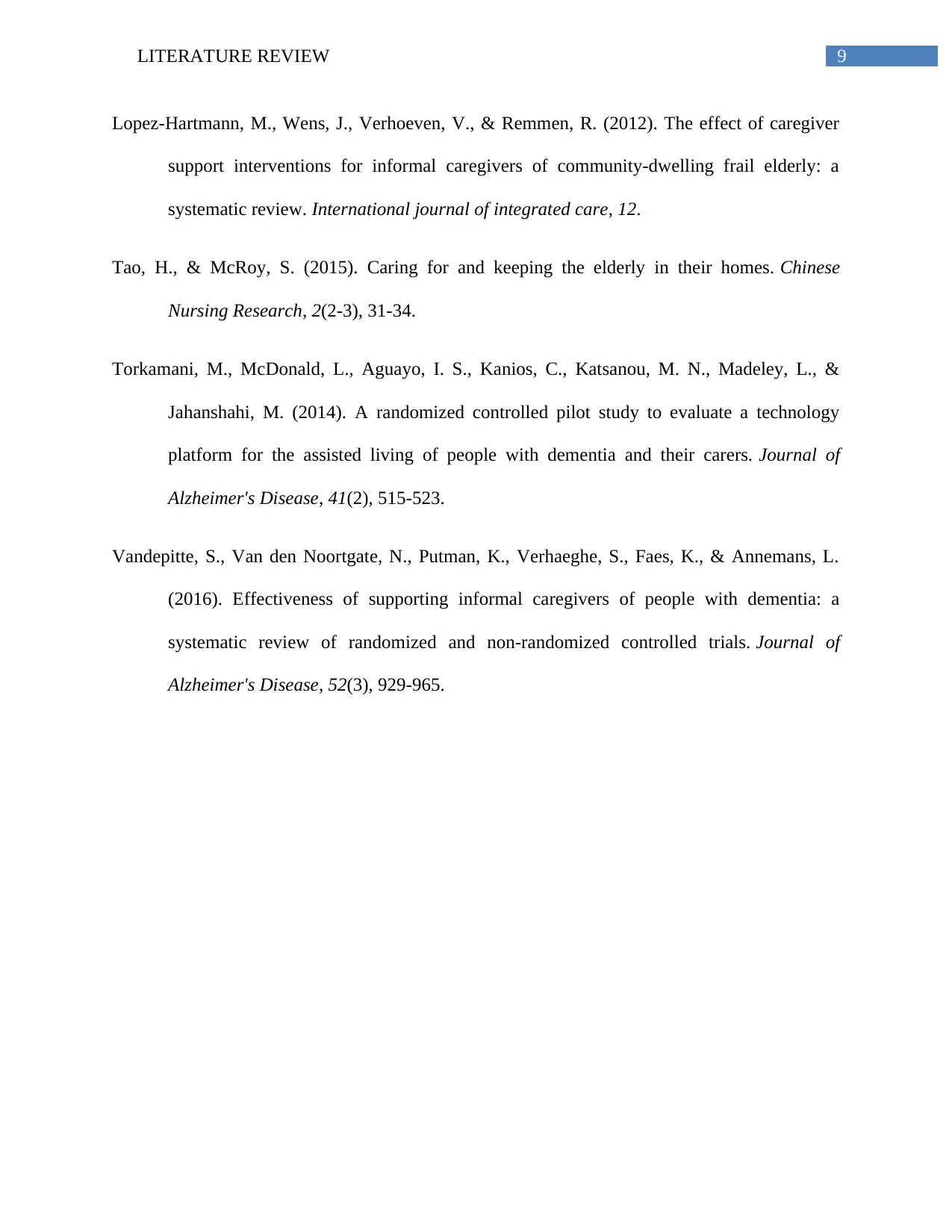
9LITERATURE REVIEW
Lopez-Hartmann, M., Wens, J., Verhoeven, V., & Remmen, R. (2012). The effect of caregiver
support interventions for informal caregivers of community-dwelling frail elderly: a
systematic review. International journal of integrated care, 12.
Tao, H., & McRoy, S. (2015). Caring for and keeping the elderly in their homes. Chinese
Nursing Research, 2(2-3), 31-34.
Torkamani, M., McDonald, L., Aguayo, I. S., Kanios, C., Katsanou, M. N., Madeley, L., &
Jahanshahi, M. (2014). A randomized controlled pilot study to evaluate a technology
platform for the assisted living of people with dementia and their carers. Journal of
Alzheimer's Disease, 41(2), 515-523.
Vandepitte, S., Van den Noortgate, N., Putman, K., Verhaeghe, S., Faes, K., & Annemans, L.
(2016). Effectiveness of supporting informal caregivers of people with dementia: a
systematic review of randomized and non-randomized controlled trials. Journal of
Alzheimer's Disease, 52(3), 929-965.
Lopez-Hartmann, M., Wens, J., Verhoeven, V., & Remmen, R. (2012). The effect of caregiver
support interventions for informal caregivers of community-dwelling frail elderly: a
systematic review. International journal of integrated care, 12.
Tao, H., & McRoy, S. (2015). Caring for and keeping the elderly in their homes. Chinese
Nursing Research, 2(2-3), 31-34.
Torkamani, M., McDonald, L., Aguayo, I. S., Kanios, C., Katsanou, M. N., Madeley, L., &
Jahanshahi, M. (2014). A randomized controlled pilot study to evaluate a technology
platform for the assisted living of people with dementia and their carers. Journal of
Alzheimer's Disease, 41(2), 515-523.
Vandepitte, S., Van den Noortgate, N., Putman, K., Verhaeghe, S., Faes, K., & Annemans, L.
(2016). Effectiveness of supporting informal caregivers of people with dementia: a
systematic review of randomized and non-randomized controlled trials. Journal of
Alzheimer's Disease, 52(3), 929-965.
Paraphrase This Document
Need a fresh take? Get an instant paraphrase of this document with our AI Paraphraser
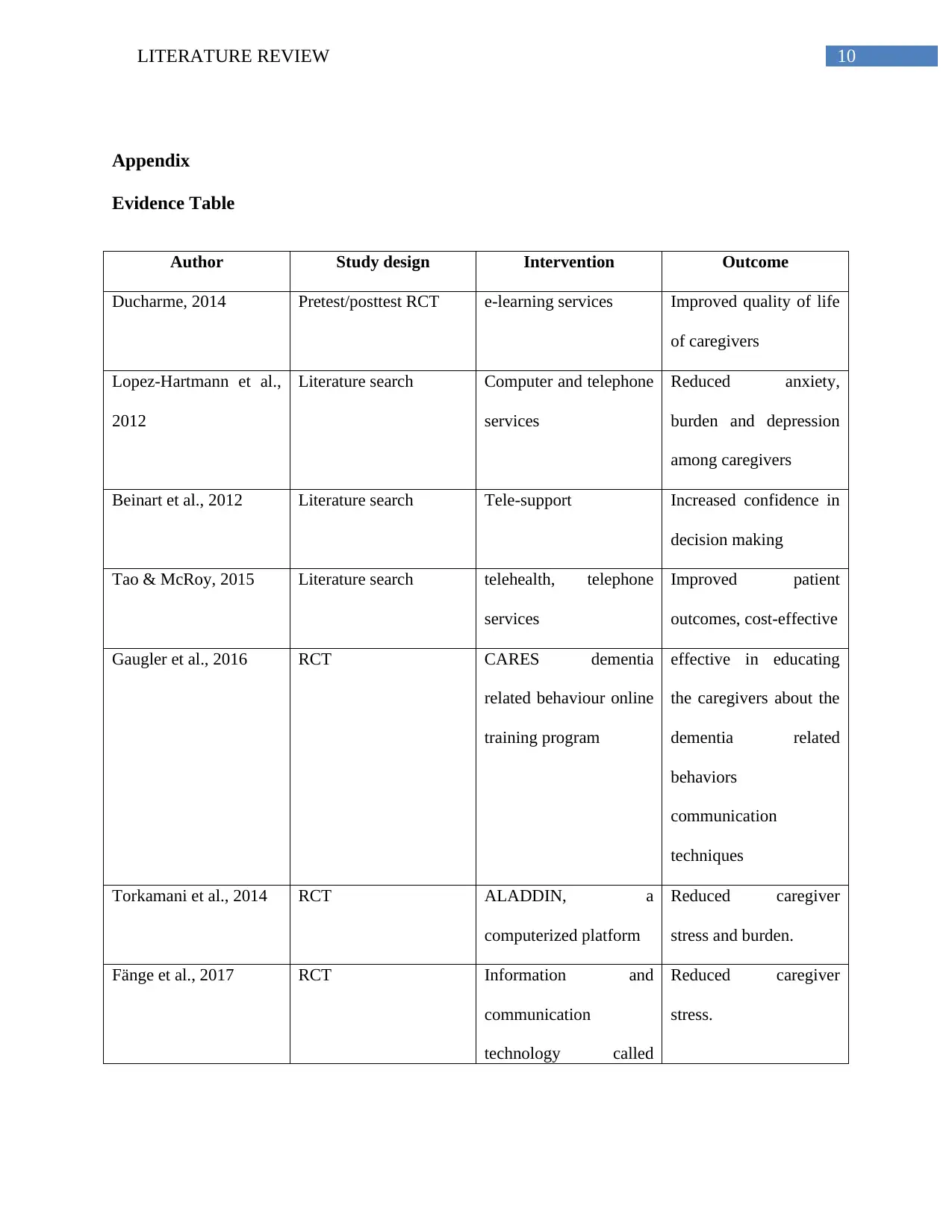
10LITERATURE REVIEW
Appendix
Evidence Table
Author Study design Intervention Outcome
Ducharme, 2014 Pretest/posttest RCT e-learning services Improved quality of life
of caregivers
Lopez-Hartmann et al.,
2012
Literature search Computer and telephone
services
Reduced anxiety,
burden and depression
among caregivers
Beinart et al., 2012 Literature search Tele-support Increased confidence in
decision making
Tao & McRoy, 2015 Literature search telehealth, telephone
services
Improved patient
outcomes, cost-effective
Gaugler et al., 2016 RCT CARES dementia
related behaviour online
training program
effective in educating
the caregivers about the
dementia related
behaviors
communication
techniques
Torkamani et al., 2014 RCT ALADDIN, a
computerized platform
Reduced caregiver
stress and burden.
Fänge et al., 2017 RCT Information and
communication
technology called
Reduced caregiver
stress.
Appendix
Evidence Table
Author Study design Intervention Outcome
Ducharme, 2014 Pretest/posttest RCT e-learning services Improved quality of life
of caregivers
Lopez-Hartmann et al.,
2012
Literature search Computer and telephone
services
Reduced anxiety,
burden and depression
among caregivers
Beinart et al., 2012 Literature search Tele-support Increased confidence in
decision making
Tao & McRoy, 2015 Literature search telehealth, telephone
services
Improved patient
outcomes, cost-effective
Gaugler et al., 2016 RCT CARES dementia
related behaviour online
training program
effective in educating
the caregivers about the
dementia related
behaviors
communication
techniques
Torkamani et al., 2014 RCT ALADDIN, a
computerized platform
Reduced caregiver
stress and burden.
Fänge et al., 2017 RCT Information and
communication
technology called
Reduced caregiver
stress.
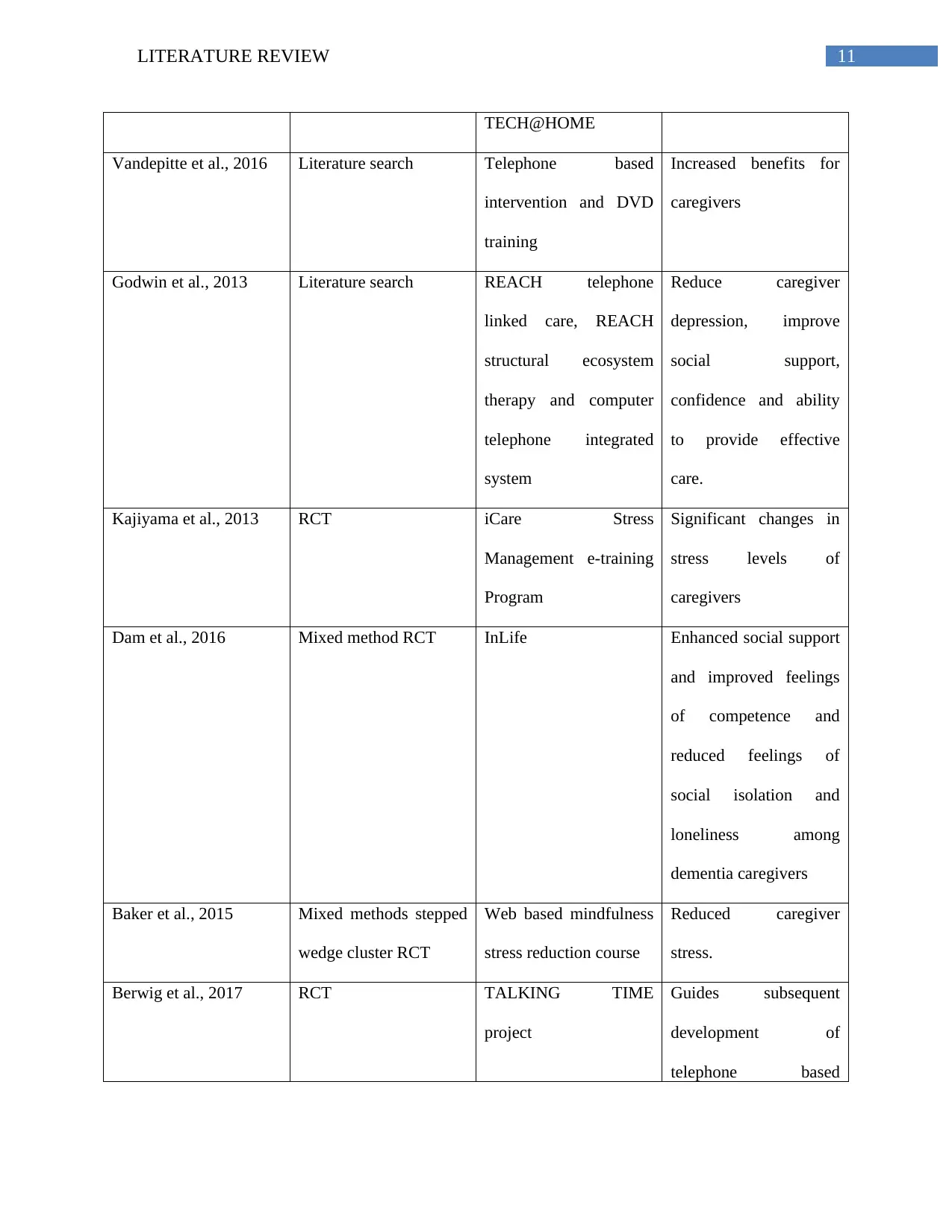
11LITERATURE REVIEW
TECH@HOME
Vandepitte et al., 2016 Literature search Telephone based
intervention and DVD
training
Increased benefits for
caregivers
Godwin et al., 2013 Literature search REACH telephone
linked care, REACH
structural ecosystem
therapy and computer
telephone integrated
system
Reduce caregiver
depression, improve
social support,
confidence and ability
to provide effective
care.
Kajiyama et al., 2013 RCT iCare Stress
Management e-training
Program
Significant changes in
stress levels of
caregivers
Dam et al., 2016 Mixed method RCT InLife Enhanced social support
and improved feelings
of competence and
reduced feelings of
social isolation and
loneliness among
dementia caregivers
Baker et al., 2015 Mixed methods stepped
wedge cluster RCT
Web based mindfulness
stress reduction course
Reduced caregiver
stress.
Berwig et al., 2017 RCT TALKING TIME
project
Guides subsequent
development of
telephone based
TECH@HOME
Vandepitte et al., 2016 Literature search Telephone based
intervention and DVD
training
Increased benefits for
caregivers
Godwin et al., 2013 Literature search REACH telephone
linked care, REACH
structural ecosystem
therapy and computer
telephone integrated
system
Reduce caregiver
depression, improve
social support,
confidence and ability
to provide effective
care.
Kajiyama et al., 2013 RCT iCare Stress
Management e-training
Program
Significant changes in
stress levels of
caregivers
Dam et al., 2016 Mixed method RCT InLife Enhanced social support
and improved feelings
of competence and
reduced feelings of
social isolation and
loneliness among
dementia caregivers
Baker et al., 2015 Mixed methods stepped
wedge cluster RCT
Web based mindfulness
stress reduction course
Reduced caregiver
stress.
Berwig et al., 2017 RCT TALKING TIME
project
Guides subsequent
development of
telephone based
⊘ This is a preview!⊘
Do you want full access?
Subscribe today to unlock all pages.

Trusted by 1+ million students worldwide
1 out of 12
Related Documents
Your All-in-One AI-Powered Toolkit for Academic Success.
+13062052269
info@desklib.com
Available 24*7 on WhatsApp / Email
![[object Object]](/_next/static/media/star-bottom.7253800d.svg)
Unlock your academic potential
Copyright © 2020–2026 A2Z Services. All Rights Reserved. Developed and managed by ZUCOL.





